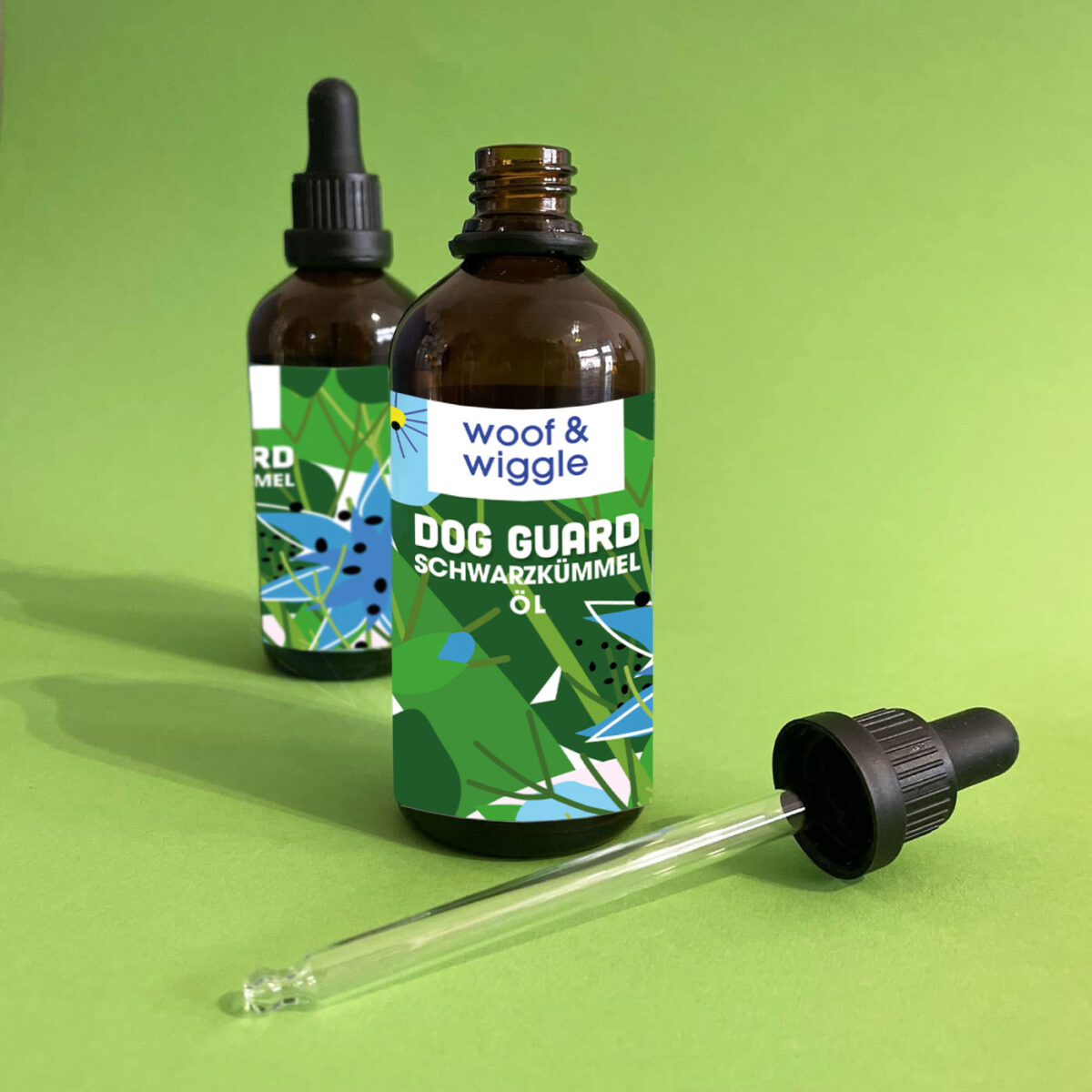“Dog Guard” Nigella oil for dogs
29,90 €
incl. VAT plus shipping
The potential effect of black cumin oil against ticks is based on scientific facts. You can find more information in the Article in the magazine “Wissenschaft & Wissen” (We have no connection to the author).
In stock
Description
Last year, we further specialized in natural medicine for dogs. In doing so, we came across these active ingredients, leading to the creation of woof & wiggle Anti-Pest Oil “Dog Guard.” It consists of 75% black seed oil, 10% coconut oil, 10% linseed oil, and 5% hemp oil. Each of these oils has a special property that has been scientifically proven to repel and keep pests at bay. You can administer the oil either with food, pure, or on a treat to make it effective. Of course, you can also apply our Anti-tick Oil directly to the fur to keep the pests away.
The ingredients of our “Dog Guard” oil:
Black Seed Oil
Black seed oil has been used since ancient times, and to this day, it is considered a versatile natural remedy for various ailments in dogs. When applied externally or internally, the oil demonstrates its versatile applications. It is particularly rich in omega-6 fatty acids, especially linoleic acid, which are essential for healthy skin and fur health as the body cannot produce them itself. Additionally, black seed oil contains a variety of vitamins and minerals such as vitamin A, vitamin B complex (such as B1, B2, B3), and vitamin C, which can support the immune system.
Furthermore, black seed oil is rich in essential oils that give it its characteristic taste and smell. These essential oils contain various active ingredients believed to have a repellent effect on pests. In particular, the high content of linoleic acid and thymoquinone makes black seed oil a natural pest repellent.
Coconut Oil
Coconut oil not only acts as a vermifuge but also as a natural pest repellent, as it contains lauric acid (dodecanoic acid, DDA). Lauric acid can affect the outer shell (cuticle) of pests by disrupting the lipid layer, which can lead to dehydration of the pests. This could cause the pests to limit their activity or even die prematurely. Lauric acid belongs to the medium-chain fatty acids, which studies have shown can repel pests. A study by the FU Berlin specifically focused on lauric acid and was able to demonstrate in experiments that just a ten percent lauric acid caused 81 to 100 percent of the pests to leave the test surface. Our gently treated, cold-pressed coconut oil contains up to 60 percent lauric acid and is therefore an effective natural pest repellent.
Linseed Oil
Linseed oil is obtained from the seeds of the flax plant. It is particularly rich in omega-3 fatty acids. These valuable fatty acids are essential for the health of humans and animals, as the body cannot produce them itself. Linseed oil also contains omega-6 fatty acids, vitamin E, and other important nutrients essential for a healthy diet. The omega-3 fatty acids in linseed oil have anti-inflammatory properties and can therefore help with various health problems. The fatty acids support the cell membranes and contribute to the regulation of metabolism. Additionally, they are involved in hormone formation and play an important role in the regeneration of skin and fur. This anti-inflammatory effect can be particularly helpful in dogs with joint problems, allergies, or skin conditions. Overall, linseed oil contributes to the general well-being and vitality of the dog.
Hemp Oil
Hemp oil is obtained from the seeds of the hemp plant (Cannabis sativa). It is rich in unsaturated omega-3 and omega-6 fatty acids. This oil offers a variety of health benefits, not only for us humans but also for our dogs. Hemp oil has no intoxicating effect on dogs, as it does not contain psychoactive substances like THC. Hemp oil is therefore safe for your dog and can be fed without concern. Hemp oil is known to improve the fur and skin of your dog. It can soothe dry, flaky skin and contribute to a shiny, thick, and healthy coat.
How to use woof & wiggle oil?
Our “Dog Guard” is administered with a pipette into the food, dripped onto treats, or given pure. Per 5 kg of the dog’s body weight = 1 drop of “Dog Guard” per day. The maximum dosage of 10 drops per day should not be exceeded for dogs over 50 kg.
Example of dosage: So, if your best friend weighs 17 kg, he should get 3 drops of “Dog Guard” daily to be optimally protected.
ATTENTION: Due to the presence of terpenes, our woof & wiggle oil is not suitable for cats!
| Dog Weight | Drops / Day |
|---|---|
| up to 5 KG | 1 |
| 10 – 15 KG | 2 – 3 |
| 20 – 25 KG | 4 – 5 |
| 30 – 35 KG | 6 – 7 |
| 40 – 45 KG | 8 – 9 |
| over 50 KG | 10 |
Every 5 KG 1 drop
Maximum dosage = 10 drops per day for a dog weighing over 50 KG.
Our woof & wiggle Dog Guard consists of a carefully selected blend of organic black seed oil, organic coconut oil, organic linseed oil, and organic hemp oil. This high-quality oil can be mixed with food, administered pure, or applied directly to the dog’s skin. The effectiveness is achieved through the natural evaporation of the dog. The selected plants contain natural terpenes with a strong smell that repel pests. This reduces the likelihood of pests settling on the dog’s skin or biting. Applying the oil creates a natural barrier against pests. A 100 ml bottle is sufficient for almost 10 months for a dog weighing over 50 kilos, with approximately 2800 drops. So, the 100 ml bottle provides almost 10 months of protection against pests.
100 ml content: 75% black seed oil, 10% coconut oil, 10% linseed oil, and 5% hemp oil
The woof & wiggle oil comes in a pharmacist bottle with a pipette and safety closure. Once the bottle has been opened, the product cannot be returned!
Interesting sources about the effectiveness of black seed oil:
- Ahmad, A. et al.: A review on therapeutic potential of Nigella sativa: A miracle herb. Asian Pac J Trop Biomed. 2013 May; 3(5): 337–352.
- Ebermann, R. & Elmadfa, I.: Lehrbuch Lebensmittelchemie und Ernährung, Springer-Verlag, 2008
- Eid AM, Elmarzugi NA, Abu Ayyash LM, Sawafta MN, Daana HI. A Review on the Cosmeceutical and External Applications of Nigella sativa. J Trop Med. 2017;2017:7092514. doi:10.1155/2017/7092514
- Khan, M.A. et al.: Anticancer Activities of Nigella Sativa (Black Cumin). Afr J Tradit Complement Altern Med. 2011; 8(5 Suppl): 226–232.
- Lim, T.K.: Edible Medicinal And Non-Medicinal Plants: Volume 5, Fruits, Springer-Verlag, 2013
- Oskouei Z, Akaberi M, Hosseinzadeh H. A glance at black cumin (Nigella sativa) and its active constituent, thymoquinone, in ischemia: a review. Iran J Basic Med Sci. 2018;21(12):1200-1209. doi:10.22038/ijbms.2018.31703.7630
- Peter, K.V.: Handbook of herbs and spices, Volume 2, WP Woodhead Publishing, Second Edition, 201






